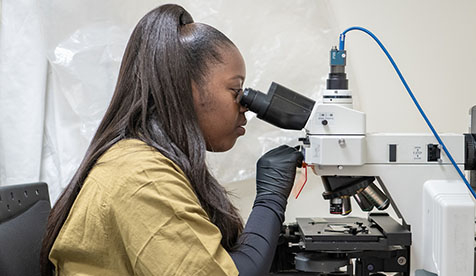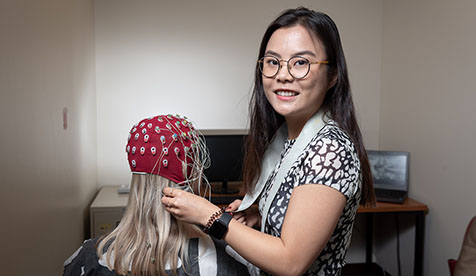You’ll be able to take part in hands-on research starting your first year. Students work closely with faculty on projects in artificial intelligence (AI), neuroscience, linguistics, philosophy, and perception, and receive support through the Undergraduate Research Center and its summer research program.
Seven faculty members in the department are part of the Mind and Brain Lab on campus; all of them welcome student researchers.
Shengyun Gu is a linguist who works on the structure, acquisition, and processing of languages, particularly Shanghai Sign Language and American Sign Language (ASL). Her major research interests include phonology, morphology, phonetics, prosody, first language phonological development, second language accents, bimodal bilingualism, relationships between language and cognition, and language documentation. Along with Prof. Hector Camarillo Abad in the computer science department, she was recently awarded a New Harmonies Grant that is funding student research.
Carmel Levitan has two main research areas that both involve students. She studies multisensory perception and interactions, including vision, sound, touch, smell, and taste. She is involved in several collaborative open science projects, which are a great entry point for students new to research.
Justin Li does research in artificial intelligence (AI) and cognitive modeling. His primary research area explores the strategies that people and artificial agents might use in their search for knowledge during problem solving, from indicators that more knowledge is needed, to strategies for acquiring that knowledge, to the mechanisms, algorithms, and representations of knowledge for efficient retrieval.
Stephanie Nelli and her students are using neuroscience and machine learning to study the computational principles underlying rapid learning and flexible decision-making, and language (including its structure, acquisition, and processing; she also has an active cross-cultural collaboration in Thailand. They have a new project about individualized neural-behavioral fingerprints during music perception and athletic activities. Why do different brains often respond differently to the same stimuli? Are there predictable cross-cultural differences?
Dylan Sabo’s research team engages with philosophical questions foundational to cognitive science. They are currently working on two projects: (1) reviewing and critiquing evidence about whether non-human animals are capable of propositional thought, and (2) reviewing published work in cognitive neuroscience to identify how neuroscientists characterize the relationship between cognitive phenomena and neural activity, and to describe the implications of these characterizations for the mind-body problem.
Sasha Sherman, 2025 recipient of the Award for Distinguished Creative Activity and Research Mentoring, asks questions about art and well-being, and studies the impacts of engaging with art both in the lab and in galleries and museums. She is studying the transformative impact of generative AI on human creativity, skill development, and aesthetic judgment.
Kevin Urstadt’s lab studies functional neuroanatomy, neuroscience of addiction and withdrawal, and neuro-circuitry of hunger, disgust, and pleasure. His current project analyzes how transcription factors rewire the rat brain during phases of cocaine addiction, revealed through brain tissue-staining techniques and image analysis.
All cognitive science majors complete individual research on a topic of their choice for their senior comps project; recent projects include investigations of the neuroscience of free will, AI Large Language Models as a tool for endangered language preservation, and how meditation affects pain perception.







